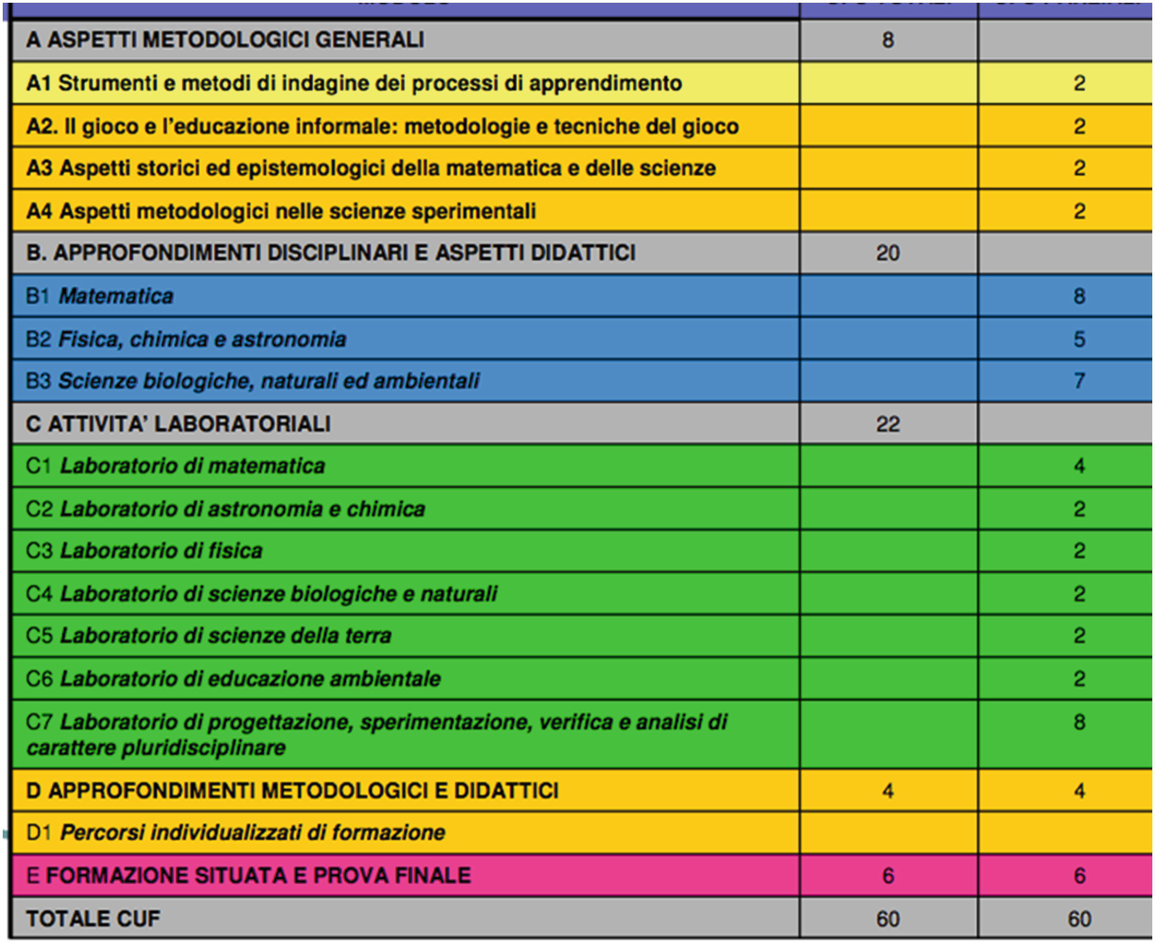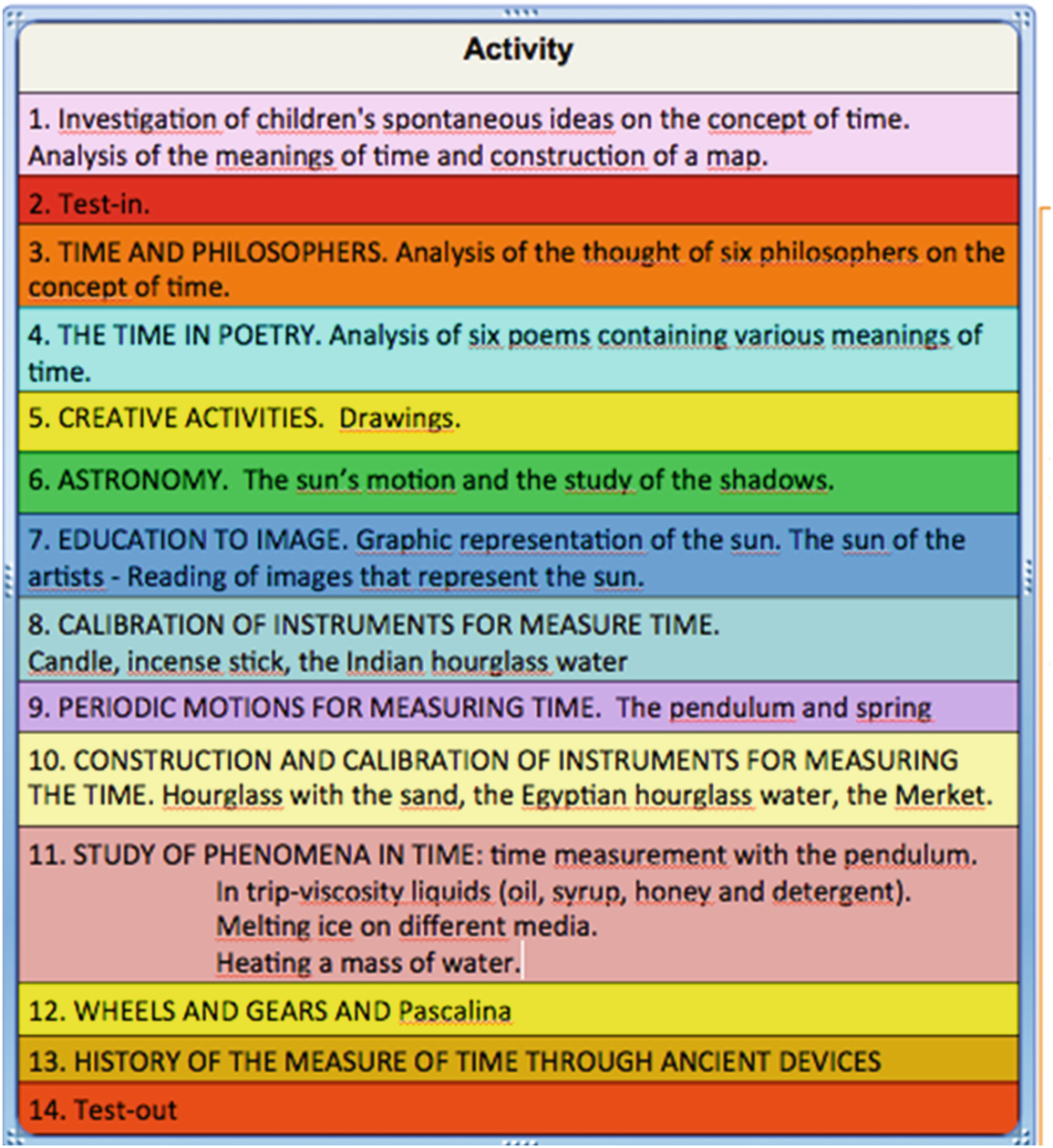23.1 Introduction
Teachers professional development in the scientific field is a complex problem where different aspects are important: limited disciplinary competences, traditional ways of addressing scientific issues, lack of expertise in grasping the opportunities and situations that allow to engage scientific learning on phenomenological contexts (Berger et al. 2008; Borko 2004; Buckberger et al. 2000). Professional development of in-service teachers, therefore, represents the possibility of improving student learning, renewing the curriculum, and introducing didactic and methodological innovation research based results (Ball and Cohen 1999; Calderhead 1996).
With the aim to improve scientific learning, the eight Italian Universities of Genova, Milano, Torino, Modena, Reggio Emilia, Napoli, Palermo and Udine worked together to offer qualified and innovative formative interventions in science for kindergarten, primary and low secondary school teachers through a biennial Master in Science Education.
23.2 The Master: Key Aspects Chosen for Professional Development
An important characteristic of the model implemented in Udine University is the interdisciplinary approach as a result of preliminary disciplinary exploration of topics and problems with cultural and social relevance. School activity is prepared by means of interdisciplinary workshops where teachers from three different scientific areas discussed with the participants of the Master of different culture, competence and professionalism.
The grafts on that interdisciplinary laboratories, of a planning activity for research based, were the most significant and qualifying elements for professional development of participants and activate the master thesis processes. Relevant was the choice in the Master organization to organized around the same topic some (3–4) thesis of teachers of different school level to build a vertical path and to compare parallel plan with different perspective. The multi-perspective of the resulting planning produces a territory of educational path with different aspect for learning trajectories of students.

General educational plan—in addition to disciplinary workshops, interdisciplinary workshops were conducted
23.3 Theoretical Framework
The theoretical framework in which the training is framed is the Model of Educational Reconstruction MER (Duit 2006; Niedderer 2001) which integrates knowledge and content analysis (CK), pedagogical knowledge with the investigation of students’ ideas (PK) and the ability to design learning environments for a teaching professional (PCK) (Shulman 1986) on basic scientific education in which physics has its own specific role in a transversal perspective.
From our research (Michelini and Stefanel 2014), a successful condition for professional development is the integration of the three models of teacher education: Metacultural, Experiential and Situated (PCK in action), including the personal involvement of teachers on the conceptual nodes (PCK test), the multi-perspective individual and group reflections, the design and experimentation of didactic paths, and the documentation and the discussion/analysis of learning progression. These are the indispensable conditions of success for the professional development that consolidates partial competences (Davis and Smithey 2009; Michelini and Stefanel 2014). In particular, the cultural model provided for the critical discussion between researchers and teachers on a disciplinary, didactic and pedagogical level; in the experiential model, the trainee year teachers personally tested the didactic proposals, through tutorials, to reflect on the conceptual nodes, recognize the characteristics of coherent paths that promote the reasoning and the involvement of children in the learning process, build activities based on problematization (inquiry-based learning).
23.4 Interdisciplinary Workshops to Promote Transversal Knowledge
School activity is prepared by means of interdisciplinary workshops where professors from three different scientific areas discussed with the participants of the Master. Learning environment was enriched by the different competences of the participants having different cultural and professional experiences, coming from the kindergarten, primary and secondary school with following degrees: natural science, math, physics, pedagogy, psychology, human science, languages.
The design looks a vertical curriculum, with attention to the interdisciplinary nature of the contexts and the transverse dimension of the conceptual elements. Strategies, instruments and methods adopted are multiple. The experiential methodology involves the active role of the children and the exploratory nature of the activities, pointed to the construction of formal thinking in terms of models and interpretative ideas, as well as representations and simultaneous use of different languages: graphics and iconographic language. Inquiry-Based Learning (IBL) produce the personal involvment children with active role hands-on and minds-on in a sequence of activities in which they have held exploratory, interpretive and creative role. Discovery learning has been promoted through guided discussions through questions—stimulus and meta-reflection has been activated through the worksheet. Common elements of the planning phase are: wide look at the subject; interpretation in different perspectives, integration and complementarity between scientific and humanistic disciplines, phenomenological-operational approach, education to the plural dimension of knowledge and its unity, analysis of the relapses according to the mode of action-research.
23.5 The Choice of the Topic Time: Projects
Time is a comprehensive, naturally transversal topic that offers the opportunity to face different kinds of experimental and exploratory activities. Time is part of many common experience and is a transversal topic that plays a fundamental role of conceptual referent that can develop in multidisciplinary way.
The theme of time was one of this transversal topic engaging different primary participant teachers. For its particular nature, time was a common matrix for three thesis articulated according to different perspectives: one proposes the integration between the literary, scientific and artistic aspects, thinking about the measure of time; another one wants to integrate philosophy, physics and astronomy, thinking of the concept of time and its measure, both thesis through human artefacts and by observations of geo-astronomical phenomena; the third develops in particular time concept education.
Time was chosen because it is a multidisciplinary and complex subject as well as a fundamental concept in anybody experience, allowing to construct a bridge between common sense and scientific knowledge, which is one of the main objectives indicated by the research literature on scientific learning processes. It is important to develop in this context for children the habit to look in terms multi-perspective knowledge, but there is the need to develop this competence for teachers by means of examples and good praxis. In this setting, we designed and tested a research-based experiment with this goal, starting with a reflection on the concept of time in the philosophical, scientific, technological, literary and artistic perspective. The theoretical framework of the teacher planning is the Model of Educational Reconstruction (MER) (Duit 2009) and the dynamical research referent is the designed based research with the approach of inquiry-based learning. Strategies, instruments and methods used are IBL, with personal involvement of children with active role hands-on and minds-on in a sequence of activities in which they have held exploratory, interpretive and creative role. The design looks a vertical curriculum, with attention to the interdisciplinary nature of the contexts and the transverse dimension of the conceptual elements. The active role of the children and the exploratory nature of the activities pointed to the construction of formal thinking in terms of models and interpretative ideas, as well as representations and simultaneous use of different languages: graphics and iconographic language. Data on learning processes are analysed in the perspective of argumentation and the reasoning in the interpretative phases by means of monitoring materials.
This work presents the educational project on the theme of time, designed and experimented in primary school, which develops transversal perspective on the subject more and which is proposed as reproducible and innovative for learning.
23.6 An Educational Project on the Theme of Time: Understand and Measure Time
The theme of time was introduced to five classes of the primary school (from the first class to the fifth class of primary school) in a vertical curriculum.

Activities
For the path, research tools have been designed: grid for the collection of spontaneous ideas; photographic journey to recall prior knowledge; programme of the discussion on the synthesis of time ideas with work sheets and small narratives (history of time, measurement, sundial, consumption watches, water clocks, watches sand); analysis of artefacts (height ring, solar ring, notturlabio, diptych, Galileo’s clock, clock counter with gears); construction and calibration of instruments; measures, reflection and formalization; homework, out-in test. Work sheets: stimulus according to the strategy PEC (Previsione, esperimento, confronto); investigation of the ideas of the philosophers; selection of poems for listening, comprehension, poetry analysis (form, structure, content); image education; siding with math: Pascaline and gears.
23.7 Learning Outcomes
- 1.
Write three sentences that contain the word time.
- 2.
It has two events that illustrate the flow of time.
- 3.
What time begins recreation? What time does it end? How long does it last?
- 4.
Shows three ways to measure a time interval.
- 5.
Write two ways to measure time.
- 6.
It indicates three phenomena that are periodic.
- 7.
Explain how you can recognize that a phenomenon is periodic.
- 8.
Draw a picture illustrating your vision of irreversibility.
- 9.
Name two contemporary phenomena.
Test-in results have shown that many pupils answer to each question giving different meanings to the time concept, i.e.: whether time, action time interval. In test out the continuity in time meaning was present in the majority of pupils, as well as the concepts of instant, time interval and that periodic event can be used for clock building. In addition this concepts are well distinguished by those of whether or perceived time interval of actions. A conceptual organization of the concepts emerge from the pupils sentences.
Children’s learning is evident from the results compared to the main research questions in the fields: methodological, cognitive and curricular.
On methodological framework, we note that observing the evolution of the phenomena helps us to understand the passage of time and the artefact influences the conceptualization of time.
In cognitive domain, we can see that spontaneous language of children develops into scientific language in relation to the acquired concepts and that time for children is both objective and subjective experience.
In the area of curriculum, it is highlighted that the time is not a unique concept but consists of many meanings, most of which arise from the experience linked to family background or education. Furthermore, the idea of periodic time interval is not spontaneously restricted to pupils, but you can build it successfully.
On the setting, we can state that interdisciplinary approach was the most valuable aspect of this work.
Integration between disciplines returns a unified image of knowledge that, although in its specialist articulations, contributes to the organ of the cognitive experience. Transversality of ideas, contents and concepts has allowed to reconcile the humanist to the scientific field and to preserve the specificity of the various disciplines by putting it at the service of understanding.
Verticality of the course in the primary school has allowed to understand the complexity of the concept of time and the meanings to which they refer and distinguish the time’s measurement from the concept of time.
23.8 Concluding Remarks
With respect to the entire experience, the elements presented by the participants in the final thesis report have highlighted the main aspects of professional and personal growth in: mature knowledge and skills in the scientific field; acquire skills for examining learning processes; design by looking at the vertical curriculum; pay attention to the interdisciplinary nature of contexts and the transversal dimension of conceptual elements.